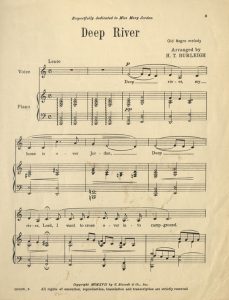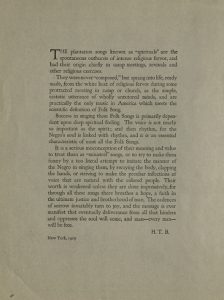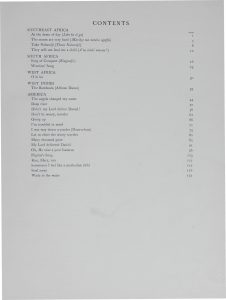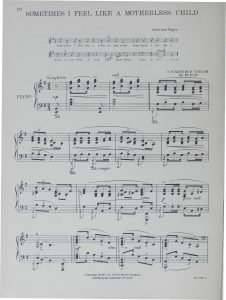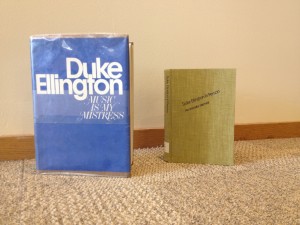
"The plantation songs known as "spirituals" are the spontaneous outbursts of intense religious fervor,"<2> as is described in the excerpt of H. T. Burleigh’s Negro Spirituals collection of “Sometimes I Feel like a Motherless Child”. This piece dates back to the historical events of slavery. This piece’s lyrics repeat “sometimes I feel like a motherless child…a long way from home…sometimes I feel like I’m almost done…true believer.” This shows the longing to be at a place they call home but it feels too far away. Their longing is there yet their faith remains. Similar songs like “Deep River” were sung by slaves in plantations as work songs reminding them that there is hope for them and very often their faith in God through these songs was what gave them the motivation to keep going. Thurman’s book "Deep River : Reflections on the Religious Insight of Certain of the Negro Spirituals"<4>provides a lens on the interconnection of religion’s significant role within spirituals.
In A New Perspective for the Use of Dialect in African American Spirituals, it describes the use of African American English and "its use in African-American Spirituals, and the sociolinguistic impact of the dialect in the United States."<1> Understanding the dialect within the music is a key component prior to teaching or performing spirituals. In Burleigh's collection it also states that "it is a serious misconception of [spirituals'] meaning and value to treat [spirituals] as "minstrel" songs, or to try to make them funny by a too literal attempt to imitate the manner of the Negro in singing them" 2. By doing so in trying to imitate actions that black folk would use in the process of singing such as swaying, clapping, or imitating the style of the voice in a joking manner would be unacceptable. One must come into the space of sharing someone's culture through the mindset of respect.
In Jones’ book “So You Want to Sing Spirituals: a Guide for Performers,” it includes a chapter titled, "Must you be black to sing spirituals?<3>" It goes into the process of the acceptable manner to take on singing or teaching a spiritual in a respectful way. Part of that process is to educate yourself on the background and history of the piece. A good way to start is also through researching the composer, if one is known. In Fall 2022, I took the class African American Song Literature where we analyzed a similar article on how to respectfully perform an African American piece since we were expected to present a poem or a song from a Black composer, mine being Florence Price. We were expected to incorporate our piece in a presentation to the class where we would share the findings that we could find. We found that for many spirituals and composers there was little to no information on them that was more than a short paragraph long, if any due to how historic the piece dated back to.
I also wanted to connect the Latin American point of view through “Spiritual World in Latin America Spanish" where essayist Luis Racionero expresses ¨we are all one¨, every living being is part of the universe, as everything we have around. When someone lives any kind of transcendental experience it is impossible to be afraid of death. The ALL doesn’t die, it is just transformed.”<5> Religion itself is an all encompassing tradition that connects various cultures and races around the world. A belief in a higher power and hope regardless if one believes in a God or not, is something that can be seen in global and local music.
Lastly, Roberts’ book “Back Music of Two Worlds : African, Caribbean, Latin, and African-American Traditions” consists of chapters including 2. Cultural Blending: The First Afro-American Styles and 7. Fusions: Jazz, Latin America, and Africa,<6> which go more into depth about the connections between African American style of music and its blending with South and Central America, and the Caribbean where we can see Afro-latinx fusions of music and culture.
1. Barber, Felicia Raphael Marie. 2021. A New Perspective for the Use of Dialect in African American Spirituals : History, Context, and Linguistics. Lanham: Lexington Books.<1>
2. “CONTENTdm.” n.d. Digital.library.temple.edu. https://digital.library.temple.edu/digital/collection/p15037coll1/id/5392<2>.
3. Jones, Randye. 2019. So You Want to Sing Spirituals : a Guide for Performers. Lanham: Rowman & Littlefield.<3>
4. Thurman, Howard. 1969. Deep River : Reflections on the Religious Insight of Certain of the Negro Spirituals. Port Washington, N.Y: Kennikat Press<4>.
5. “Spiritual World in Latin America - Youthreporter.” Www.youthreporter.eu, www.youthreporter.eu/de/beitrag/spiritual-world-in-latin-america.14130/. Accessed 12 Oct. 2023.<5>
6. Roberts, John Storm. 1998. Black Music of Two Worlds : African, Caribbean, Latin, and African-American Traditions. 2nd edition. New York: Schirmer Books.<6>

